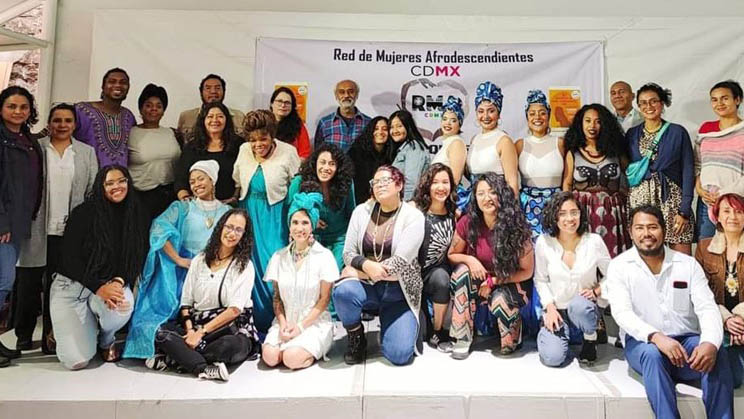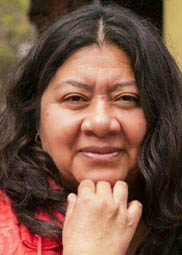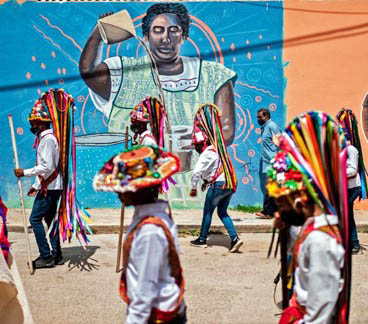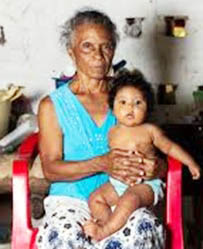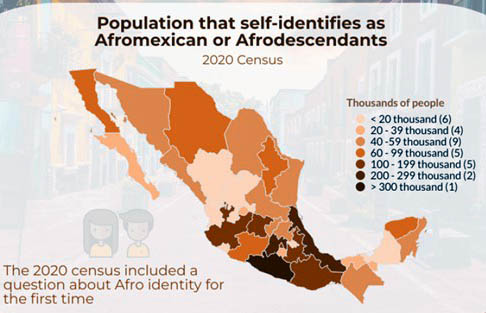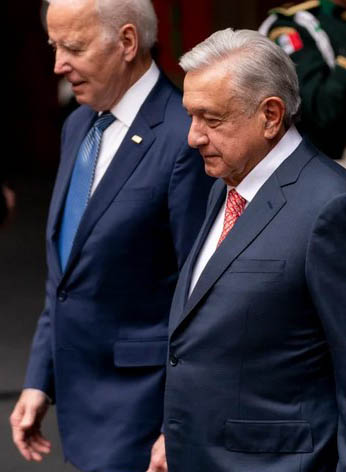|
|
|
|
The weekly newsletter of the México Solidarity Project |
|
|
|
Online at mexicosolidarityproject.org |
|
May 24, 2023/ This week's issue/ Meizhu Lui, for the editorial team |
|
|
In México Today: Black, Bold, and Beautiful! |
|
How many of us colored girls wanted to be white when we were growing up? As the only Chinese in my school, I watched the white girls sauntering by with their casual confidence and felt like I was a watching a movie. In my son’s schoolyard came the taunt: “You’re not white, you’re not black, you’re nothing!”
That’s the worst, to be nothing. To pass unseen through the land of your birth and your ancestor’s deaths. When others see through you, it’s hard to see yourself.
Under President Vicente Guerrero, himself an Afro-descendant, México abolished slavery in 1829, not that long after throwing off Spanish rule. But black people in México, even with that promising beginning, soon found themselves relegated to the periphery, their story erased like a mistake on a page.
In our interview this week, Cecilia Estrada and Ana de las Flores — from the Afro-descendant Women's Network of Mexico City — want Afro-descendants to take their rightful place in every school history book and in every aspect of life today. They celebrated the official Mexican recognition of Afro-descendants in 2020, a move that made their communities visible at last.
But that would be just the beginning. Their communities are now boldly emerging from the shadows, and the Women's Network is helping their sisters discover themselves and explore their heritage with pride and dignity. With Afro-descendants everywhere, they’re making the world a place where people of every color and race can be seen, heard, and loved. |
|
|
|
Don’t miss an issue! Sign up for a free México Solidarity Bulletin subscription. |
|
|
|
|
Invisible No More: Affirming Mexico’s Afro-Descendants |
|
|
Cecilia Estrada Gasga, a grad of the National Institute of Anthropology and History Afro-descendants in México and Latin America program. |
|
Cecilia Estrada Gasga, a proud Afro-descendant from México City, has a close relationship to the Costa Chica of Guerrero where her family lives. In 2019, she founded the Afro-descendant Women's Network of Mexico City, an activist group that works to raise awareness and fight for the rights of Mexican women. Ana de las Flores, an Afro-indigenous artist, co-founded the Lunas de Barro Negro Collective and also plays an active role with the Afro-descendant Women's Network of Mexico City. |
|
|
Ana de las Flores, certified in Afro-Latin American Studies from Harvard University's Afro-Latin American Research Institute. |
|
When and under what conditions did Africans arrive in México?
Cecilia: In 1519, the Spanish colonizer Hernán Cortés first arrived with his expedition to what was then the Aztec empire. An African subject to the Spanish crown, Juan Garrido, came with him. In the 16th century, the colonizers started bringing in enslaved Africans. Slavery became widespread, especially in the 19th century, with Veracruz, the city founded by Cortés, the main port of entry, along with Acapulco and Campeche.
The Africans worked in agriculture in the rural areas of the south. They worked in mining in the north, as domestics in urban areas. Their descendants now live in every part of México.
How did/do people of African descent fit into the project of creating a racial/national identity through mestizaje, racial mixing?
Ana: After gaining independence from Spain, México needed a new national identity to replace the racial hierarchy that put the Spanish, the whites, on top. The government promoted what became known as mestizaje, a racist ideology that homogenized the “Mexican” identity and denied the ethnic-cultural diversity of the entire Mexican territory.
That made Afro-descendants invisible. The mestizaje ideology did not consider Afro-descendants in the “mix,” especially since the ideology actually amounted to a whitewashing that made it difficult to be black. |
|
Cecilia: Mexican officials attempted to wipe out African culture. They prohibited African moves to form their own groups or meet together. They prohibited the drum, a traditional means of communication, to keep Africans from organizing and resisting the socio-economic order. But Afro-descendants did resist. They kept their culture alive and still practice their traditions in music, dance, and food.
México’s marginalized people of African descent banded together. Today, fully Afro-descendant communities continue to exist in the Costa Chica region along the southern coast of Oaxaca and Guerrero. |
|
|
Juneteenth Celebration in Nacimiento De Los Negros, Coahuila/Pedro Pardo, AFP via Getty Images |
|
Can you describe life in these Afro-descendant communities?
Ana: Peripheral people live in peripheral places! Statistical research makes clear that the darker the color of the skin, the poorer we are and the fewer our opportunities for education and work wherever we live.
Our people live with little access to health, education, or decent work, particularly in Afro-descendant coastal communities. Fishing has historically been an important economic activity, but environmental racism has affected the flora and fauna and greatly diminished fishing opportunities. |
|
In Guerrero’s Barra de Tecoanapa, for instance, Afro-descendant women, many of them single mothers, face many challenges. They lack the resources to fish effectively and the means to keep their fish fresh.
The intense physical effort fishing requires can even put their lives at risk. If they get sick, they have to travel for hours to reach the nearest health provider.
That’s why many of the women have made their way north to México City, where we live. |
|
|
Hugo Arellanes, Al Dia |
|
How do you see the relationship between Afro-descendants and indigenous peoples?
Cecilia: In the early days of slavery, Africans and indigenous peoples lived close together, but the colonizers separated them. They did not want the two oppressed groups to form alliances. But both groups recognized that they faced many of the same marginalization issues. During colonial times, enslaved Africans could achieve their freedom by marrying an indigenous person. With Afro-descendants and indigenous people sharing spaces and conditions, a lot of intermarriage continues today.
How have Afro-descendants organized themselves? What demands are they prioritizing? |
|
Cecilia: Our first need: to be visible, to have the public recognize that people of African descent have lived in this territory for centuries. In 2020, the Mexican census added the category of “Afro-descendant” for the first time, and we also achieved constitutional recognition of Afro-Mexican peoples, a major step forward. |
|
|
Afro-descendants in México/Wilson Center |
|
We’ve finally become visible, and that gives us access to resources and the right to demand equality. By reinforcing our identity and knowing our roots, by self-ascribing, we feel proud to be black. Today, we’re openly exploring our rich heritage.
Ana: We’re working to eliminate false stereotypes in education. We’re demanding that the textbooks of our children include the history of Africans in México and treat our people not as “slaves” but as people kidnapped and taken from their places of origin to be exploited and enslaved in other territories. Children must know that these Africans — people like the rebel Maroons — resisted and fought for liberation.
We demand to be treated with dignity. We will not let color-based violence — or the racism of so-called “funny” comments about how whitening “improves the race” — be normalized. We will not accept the racism we see in health care. In some hospitals in the Costa Chica, the medical staff won’t give Afro-descendant women in labor anesthesia — or attend to them last — because they believe black women can endure more pain.
And we demand reparations! México owes a great historical debt to our people.
You participated in the Summit for Peace in February that brought together people from the Black Lives Matter movement in the United States with Afro-descendants in other Latin American countries. How does working across borders help you in México?
Cecilia: People of African descent are facing the same problems throughout the hemisphere. Through our powerful network of Afro-descendant, Afro-diasporic women in México City, we have become part of a global movement for justice. |
|
|
AMLO on the True Meaning of Democracy |
|
Earlier this spring, Mexican President Andres Manuel López Obrador challenged U.S. President Joe Biden to end an attitude of “abandonment” and “disdain” for Latin America and the Caribbean as the two leaders met a summit of North American leaders. We present here some highlights from AMLO's remarks.
Many of the great crimes against humanity have been committed in the name of God or in the name of democracy.
It is important, because of that, to return to the original and true meaning of the concept of democracy. Aristotle said that there were three good and three bad forms of government. He came to the conclusion that democracy was the best, or the least bad, and he argued that democracy, as in the Greek origin of the word, consisted of the power of the people. |
|
|
In our time, there is still a mixture of oligarchy and democracy, or a simulated and mediated democracy. That is to say, in some countries, the oligarchy reigns with the façade of democracy.
For example, how can we talk about democracy if the elites dominate, and not the majorities? How can we talk about democracy if there is no separation of economic power and political power? How can we talk about democracy if, in recent times, there has been the most offensive concentration of wealth in a few hands in the history of the world?
…That is why we have to move further and further away from kratos [“power” in Greek] without demos [“people” in Greek], from power without the people, and make sure that the central purpose of the government is always to seek the happiness of the people, of a government of the people and for the people…
May democracy be authentic and true and may justice always triumph over power! |
|
|
Recent news reports and commentaries, from progressive and mainstream media,
México: AMLO Accuses USAID of Funding Opposition, Resumen. The U.S. Agency for International Development has denied that the funds it sends into México have a political objective. But President López Obrador says the agency is granting dollars to groups openly against a legitimately elected independent government.
Ulises Rodríguez López, Morena imparable; tiene más de 30 puntos de ventaja para 2024, Polemón. El partido guinda tiene por si solo el 61% de la preferencia efectiva; 31 puntos arriba de la coalición Va X México integrada por el PAN, con el 18%, PRI con el 10% y PRD con el 2% de las preferencias.
Jesus Jiménez, México’s Lavish Presidential Plane Arrives at Its New Home in Tajikistan, New York Times. AMLO has completed the sale of the jet he called an unconscionable example of the excess put in place by former President Felipe Calderón and used by his successor, Enrique Peña Nieto.
Nancy Flores, EU donó 48.9 millones de pesos a ‘guerra sucia’ de Claudio X, ContraLinea. Entre 2019 y 2021, el gobierno de Estados Unidos donó 48.9 millones de pesos a la “guerra sucia” del empresario Claudio X González Guajardo contra el gobierno de López Obrador.
AMLO announces pay increase for México teachers, Riviera Maya News. Teachers and other education workers will receive an 8.2 percent increase retroactive to January 2023, says the Mexican president, to help “strengthen public education and improve the conditions of the workforce.”
Obed Rosas, El voluminoso archivo con las promesas incumplidas del PRI no ayudan a su candidata, Sin Embargo. Luego de más de 90 años de gobiernos priistas, la entidad tiene altos niveles de inseguridad y pobreza, y una de las mayores percepciones de corrupción entre su población, como muestran las cifras oficiales.
México refuses to hand over trade bloc presidency to Peru’s de facto president, Peoples Dispatch. AMLO has reiterated that México does not consider Dina Boluarte to be the legal president of Peru since the coup against Pedro Castillo.
«Otro sistema de vida es posible»: pueblos anuncian campaña global El Sur Resiste, des Informémonos. Pueblos y organizaciones indígenas anunciaron la campaña global «El Sur Resiste», con el fin de articular las luchas internacionales contra el despojo, el saqueo y la destrucción territorial a manos de «los grandes capitales globales y estados corporativos».
Megan Janetsky, Mexico prosecutors withdraw case against woman sentenced to prison for killing man raping her, AP. Mexican prosecutors announced Saturday night they are withdrawing a case against a woman sentenced to six years in prison for killing a man as he raped and attacked her. The sentencing ruling last week had touched off a public outcry.
Mathieu Tourliere, La FGR, sin avances reales contra el espionaje gubernamental, Proceso. Aunque desde 2017 se reveló el primer contrato de la entonces PGR para adquirir el sistema espía Pegasus en 2014, la Fiscalía General de la República anunció apenas el pasado lunes 15 que abrió una investigación contra cuatro exfuncionarios que firmaron la adquisición. |
|
|
The Mexico Solidarity Project brings together activists from various socialist and left organizations and individuals committed to worker and global justice who see the 2018 election of Andrés Manuel López Obrador as president of México as a watershed moment. AMLO and his progressive Morena party aim to end generations of corruption, impoverishment, and subservience to US interests. Our Project supports not just Morena, but all Mexicans struggling for basic rights, and opposes US efforts to undermine organizing and México’s national sovereignty.
Editorial committee: Meizhu Lui, Bruce Hobson, Bill Gallegos, Sam Pizzigati, Courtney Childs, Victoria Hamlin, Agatha Hinman, Steven Hollis, Daniel McCool, Betty Forrester, Jesús Hermosillo. To give feedback or get involved yourself, please email us! |
|
|
|
Subscribe! Get the México Solidarity Bulletin in your email box every week. |
|
|
|
Web page and application support for the México Solidarity Project from NOVA Web Development, a democratically run, worker-owned and operated cooperative focused on developing free software tools for progressive organizations. |

